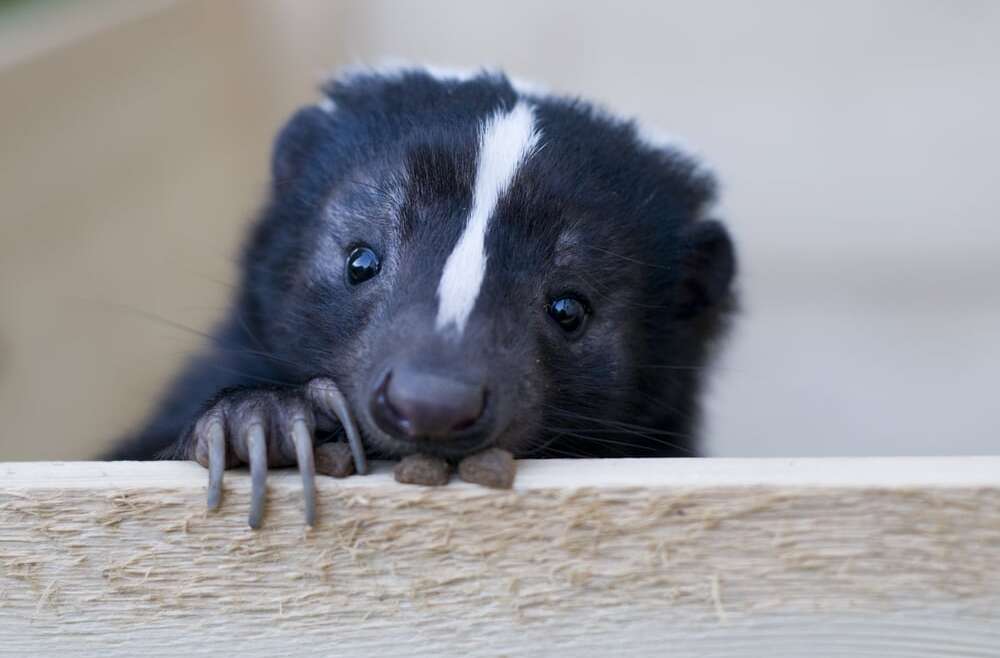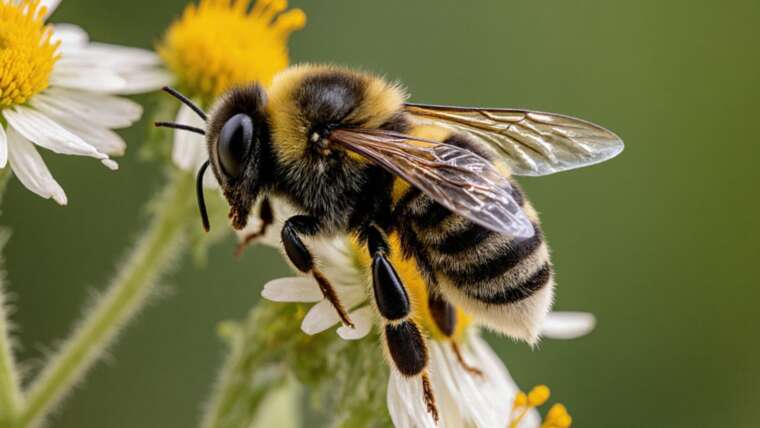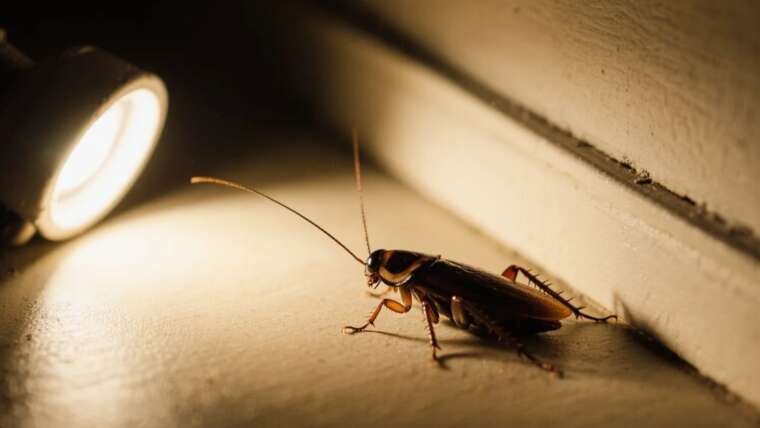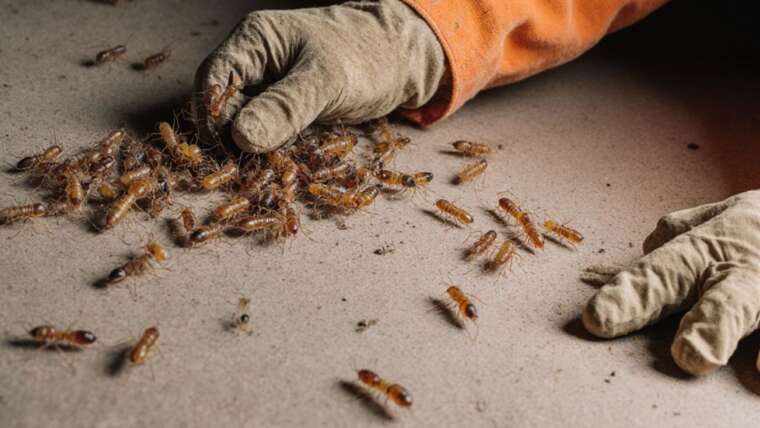- Why skunks spray: Skunks release a sulfur-based liquid as a defense mechanism when they feel threatened, producing a powerful, long-lasting odor. Tip: Knowing the warning signs a skunk displays before spraying can help you avoid an encounter; these include stamping their feet, hissing, and raising their tail.
- Health effects: Skunk spray isn’t poisonous but can irritate your eyes and lungs and cause coughing or nausea. In rare cases, dogs may suffer more serious effects. Fact: Dogs have a more sensitive respiratory system than humans, so even mild exposure can lead to greater discomfort or respiratory issues.
- If you’ve been sprayed by a skunk: Stay outside, rinse eyes, and wash with a deodorizing solution like hydrogen peroxide, baking soda, and dish soap. Tip: Wear gloves when applying any cleaning solution to avoid transferring the smell to your hands.
- Skunk smell removal: Home remedies (vinegar, baking soda, peroxide) or commercial removers can help with lingering smells on people, pets, cars, and homes. Tip: Always perform a patch test when using homemade remedies on fabric to ensure no damage occurs.
- Prevention and control: Secure trash, remove food sources, and block shelter spots, or call Terminix for humane, professional skunk removal. Fact: Skunks are nocturnal, so implementing preventive measures is best done at dusk or dawn when they are most active.
Few things are as unpleasant and long-lasting as the effects of skunk spray. Whether you’ve accidentally startled a skunk on an evening walk or found your pet on the wrong end of a smelly encounter, dealing with skunk spray can feel overwhelming.
Why do skunks spray? This defensive behavior is their way of warding off perceived threats. When a skunk feels cornered or scared, it releases a pungent, sulfur-based liquid from its scent glands. Understanding this behavior can help you navigate encounters without provoking them.
If you’ve found yourself in this unfortunate and smelly situation, you’re probably wondering what to do if you’re sprayed by a skunk. In the following sections, we’ll cover what to do if you’re sprayed by a skunk and discuss tips to help with skunk smell removal.
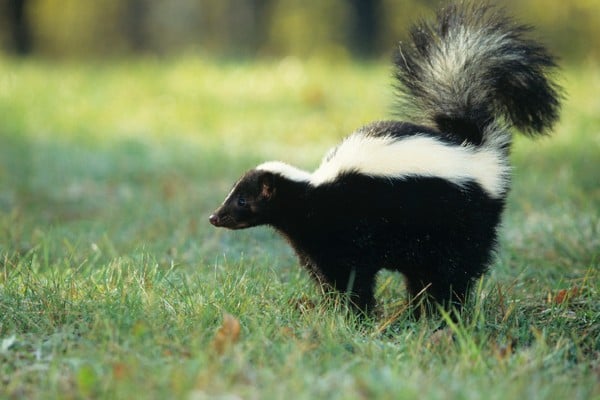
Is skunk spray harmful to people and pets?
Skunk spray is a strong, foul-smelling liquid that skunks release when threatened. Its odor comes from sulfur-based compounds called thiols, which smell like rotten eggs and linger for a long time. The spray also contains thioacetates, which break down slowly and release odor for days or even weeks, making cleanup especially difficult if not handled quickly.
If you’ve been sprayed by a skunk, you’ll be relieved to know that skunk spray is not poisonous. However, it can be harmful and is a strong irritant. Tip: Create a quick-access emergency kit for skunk encounters, which should include a pair of gloves, a spray bottle for your DIY solution, and a clean towel.
- People and pets: Skunk spray can cause temporary eye irritation and redness. Inhaling the spray can lead to coughing or shortness of breath, and the pungent odor may cause nausea.
- Dogs: Skunk spray toxicosis is a rare but serious form of poisoning that can occur in dogs after heavy exposure. It happens when the chemicals in the spray damage a dog’s red blood cells, leading to a severe type of anemia. Fact: Always monitor dogs closely after a spray incident; signs of distress could include excessive panting, lethargy, and weakness.
If symptoms persist or a person or pet has been heavily sprayed by a skunk, it’s always best to seek advice from a medical professional or a veterinarian.
Immediate steps to take if you’re sprayed by a skunk
If you or your pet is sprayed by a skunk, the key is to act quickly. Fact: The sooner you address the issue, the easier it will be to remove the odor and prevent it from setting into skin or fur.
- Stay outside: Do not go indoors. The smell will spread and cling to everything.
- Protect your eyes: Rinse your eyes immediately with cool water to prevent irritation. Tip: If you wear contact lenses, remove them immediately to avoid further irritation.
- Use a deodorizing solution: A popular and effective DIY solution is a mixture of hydrogen peroxide, baking soda, and a small amount of dish soap. Remember to use it promptly for maximum effectiveness.
- Wash thoroughly: Apply the solution generously, lather well, and let it sit for a few minutes before rinsing. Repeat as needed. Do not use this solution on pets’ faces, and avoid their eyes and ears. Tip: If dealing with a pet that’s been sprayed, consider keeping them outside until the initial wash is complete.
- Seek medical or veterinary care: If irritation symptoms persist or if your pet seems unwell, contact a doctor or veterinarian for guidance.
If the skunk is still on your property, do not attempt to trap or handle it yourself. Terminix professional wildlife removal services can help safely and humanely trap and relocate the animal. Fact: Always report skunks that appear unusually tame or aggressive, as they may pose a threat of rabies.
If a skunk is acting strangely (it seems disoriented, aggressive, or wandering during the day), do not approach it. This could be a sign of rabies. Instead, contact your local animal control or a wildlife control agency immediately.
Tips for removing that skunk smell
Skunks almost always give plenty of warning before they spray. The skunk may stamp its front paws, hiss, raise its tail, twist its hindquarters in your direction, or show signs of making a forward charge. Fact: Being aware of your surroundings and recognizing these signs can help you avoid an unpleasant confrontation.
If you are unlucky enough to end up doused in skunk spray, some home remedies can help with skunk smell removal. Without treatment, the skunk smell can linger for weeks or even months. The odor is highly persistent and can be reactivated by moisture.
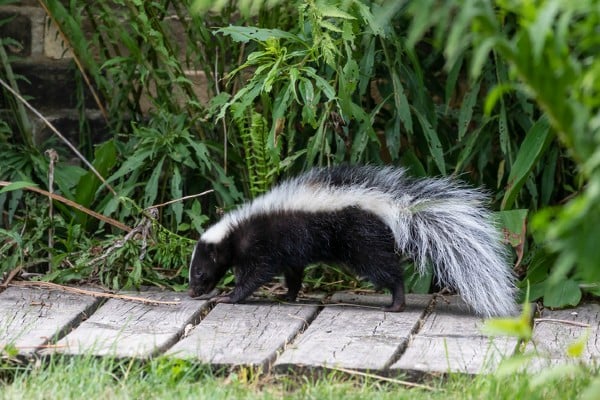
Tomato juice
Tomato juice is probably the most famous tip, and while washing your hair with a jar of spaghetti sauce may make some difference, throwing a can of tomato paste in with your laundry is not exactly going to help. Tip: If you opt for tomato juice, don’t rely on it solely; it can just temporarily mask the odor rather than eliminate it.
The acidic content of tomato extracts can help break down some of the chemicals in skunk musk, but it may only mask the odor and not neutralize it. A few other tips can be more effective if you’ve been sprayed by a skunk.
White vinegar and hydrogen peroxide
Degreasing solutions of white vinegar or hydrogen peroxide mixed with baking soda and common dishwashing liquid can help counteract skunk spray more effectively. The Humane Society has tested and approved the following formula:
Avoid getting this solution in your or your pet’s eyes, ears, and mouth. Let it sit for five to ten minutes before rinsing thoroughly. Tip: Ensure you have adequate ventilation when mixing these solutions, as the chemical reactions can produce odors of their own.
Commercial skunk odor removers
Some pet and veterinary suppliers stock commercial skunk smell removal products. Most of these products use petroleum alpha, a non-toxic chemical, to neutralize skunk spray odors. Be sure to follow all safety precautions and the manufacturer’s recommendations. Fact: Always check product ingredients to ensure they are safe for use around pets and children.
Skunk smell removal for cars
Skunk spray odors can linger in car upholstery, carpets, and air vents. Here’s how to help tackle it:
- Ventilation: Open all doors and windows to air out the vehicle.
- Deodorizing solution: Use the hydrogen peroxide solution mentioned above, gently clean affected surfaces with a cloth, then wipe dry. Tip: Avoid spraying the solution directly on any electronic components.
- Activated charcoal or baking soda: Leave a bowl of activated charcoal or baking soda in the car overnight to absorb lingering odors.
- Replace air filters: If the smell persists, replace your car’s cabin air filter, as it may have absorbed the odor. Tip: Regular maintenance checks on your vehicle can help prevent smells from settling in the first place.
How to get rid of skunk smell in your home
Dealing with the lingering smell of skunk spray in your home can be challenging, but with the right techniques, you can help neutralize the odor and restore freshness.
- Ventilate the space: Open windows and doors to improve airflow and reduce lingering odors. Use fans to circulate fresh air. Fact: Keeping air circulating can help evaporate odors faster.
- Clean hard surfaces: Wash floors, walls, and furniture with a mixture of vinegar and water to help neutralize the smell.
- Use baking soda: Sprinkle baking soda on carpets and upholstery, let it sit for a few hours, then vacuum to absorb odors. Tip: For particularly stubborn odors, consider leaving the baking soda on overnight before vacuuming it up.
- Wash fabrics: Launder clothes, curtains, and linens with a mix of regular detergent and ½ cup of baking soda or vinegar. Fact: Hot water can help lift odors better than cold, but ensure items can be washed in hot water.
- Air purifiers and/or odor absorbers: Activated charcoal or commercial odor eliminators can help trap and remove odors from the air.
If the smell persists, professional odor removal services may be needed to help remove it.
Preventing skunks from spraying you again
While dealing with skunk spray is unpleasant, taking steps to prevent future encounters can save you a lot of hassle. Here are some skunk prevention tips to help keep these critters and their smell away:
- Secure trash bins: Skunks are drawn to garbage for an easy meal. Use trash cans with tight-fitting lids and store them in secure areas. Tip: Consider using heavy-duty trash cans that are waft-proof.
- Eliminate food sources: Remove pet food, birdseed, and fallen fruits from your yard. Fact: Skunks are opportunistic feeders and will return to any food source they find.
- Seal entry points: Inspect your property for openings under decks, porches, and sheds. Use mesh or hardware cloth to seal these spaces, as skunks often use them for shelter. Tip: Regularly inspect your property for new entry points, especially after storms or heavy winds.
- Install motion-activated lights: Bright lights can startle skunks and discourage them from entering your yard. Fact: Skunks are nocturnal; therefore, employing lights can deter them effectively during their active hours.
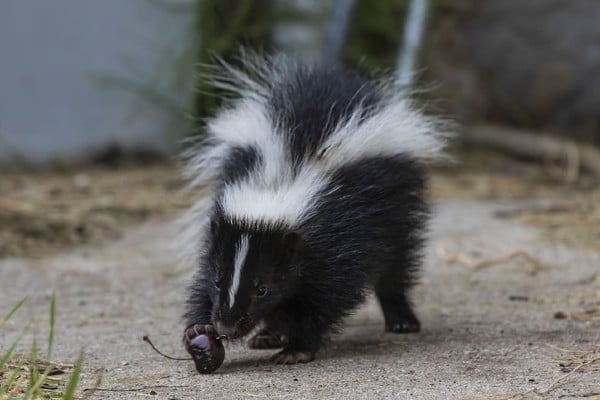
If skunks are already trying to claim your property, it’s time to call in the experts. Terminix’s professional wildlife removal services can help safely and humanely address your skunk problem. Schedule a free wildlife inspection today and reclaim your space from unwanted visitors!

